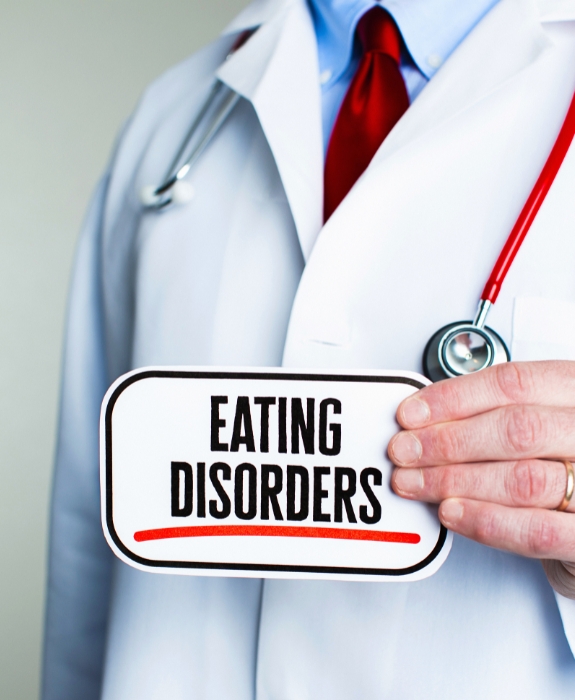People who develop unusual eating habits and attitudes about food that lead to physical and mental changes can be said to have an eating disorder. It can be difficult to tell what is considered healthy eating and what is not as people frequently go on diets and focus on their weight in their daily lives. When a person’s feelings about food or their weight become obsessive and lead to health problems then they may need to get treatment for their behavior.

What is an Eating Disorder?
The term ‘Eating Disorder’ is a broad connotation for a wide variety of behavioral conditions that are characterized by severe and persistent irregularities in eating habits resulting in unsettling thoughts and emotions. Eating Disorders are very serious conditions that affect a person’s physical, psychological, and social well-being.
Eating disorders affect about 5% of the total population and usually develop during the adolescent and young adult years. They are often associated with an excessive obsession with food, body shape, body weight and anxiety about consuming or the consequences of consuming certain foods.
A person suffering from an eating disorder will often show symptoms like self-restrictive eating, avoiding certain foods, binge eating, vomiting as a means of purging, abusing laxatives, and excessive exercise. These behaviors are driven in ways that often appear as a form of addiction and can have adverse consequences on an individual’s health and quality of life. Professional help is crucial and must be taken as early as possible.
Types of eating disorders
Different types of eating disorders lead to varying relationships with food and eating. Some become very restrictive and rigid, and others tend to lose control of food. Even though eating disorders can all share some similarities, the symptoms of each disorder can vary greatly. These are the most common types of eating disorders that require treatment.
1. Anorexia Nervosa:
Restrictive eating is one of the most frequent symptoms of eating disorders, and people with anorexia tend to focus on very restrictive habits. They might intentionally reduce their calorie intake; avoid eating certain types of foods or fast regularly. As a result of their restrictive eating patterns, they will rapidly lose weight and develop an intense fear of gaining any weight.
People with anorexia tend to have a distorted image of what they look like, believing that they are much bigger than they are. They often become underweight and develop serious health problems as a result of being malnourished. During treatment, they will be required to gain weight and learn how to repair their relationship with food.
2. Bulimia Nervosa:
The second most common type of eating disorder is bulimia nervosa which combines both restrictive eating habits and binge eating. A common symptom of bulimic eating disorder is that the person will most often restrict their food intake but will sometimes lose control and end up eating a large amount of food quickly. They will then cope with their binge by purging through vomiting or using laxatives to get the food out of their system.
The binge and purge cycle is what characterizes someone with bulimia, along with issues of body image. Many people with bulimia have a very normal weight but have an intense fear of gaining weight following a binge. Purging can lead to very serious health problems because of the damage it causes to the body.
3. Binge Eating Disorder:
For those who are completely unable to control themselves around food, they can be said to have a binge eating disorder. Someone with a binge eating disorder has issues with overeating but does not restrict their intake or purge to get rid of calories. They will go through cycles of binging and eating unusually large amounts of food in a short time until they feel uncomfortable.
After a binge, someone with this disorder will go through a lot of feelings of guilt and shame about their behaviour. They will start to gain weight rapidly and may be overweight or, in many cases, struggle with obesity. There are many health problems associated with obesity and binge eating disorder that will need to be addressed if they receive treatment.
4. Avoidant or Restrictive Food Intake Disorder:
Although this disorder may sound similar to anorexia, it is a very different problem that can develop in childhood and continue long into adulthood. Someone with ARFID is often not intentionally trying to lose weight, but they have a general lack of interest in food or a distaste for certain colours, smells and textures. They can be very picky eaters and will consume a very small amount of calories as a result.
People with this disorder can have problems maintaining a healthy weight and may have developmental problems as they get older. They often develop nutritional deficiencies because of their aversion to certain foods or their lack of interest in eating. Their eating habits may interfere with normal social functioning, such as eating with others.
5. Orthorexia:
The term orthorexia is a more recent name for a problem that has not yet been recognized in the Diagnostic and Statistical Manual. However, awareness about this issue has been increasing as more people develop obsessions with healthy eating. Orthorexia refers to a fixation on eating healthy foods to the point of damaging your well-being.
People with orthorexia compulsively check the ingredients in food and will cut out food groups from their diet, including meat, dairy, sugar or anything that they deem unhealthy. They may rapidly lose weight and experience distress when they are unable to have access to healthy foods.
Signs of eating disorders. Early detection is key
A person will display a range of symptoms of eating disorders that indicate the need for early medical assistance. It is important to understand that not every individual with an eating disorder will display all symptoms, and the presence of one or more symptoms does not necessarily indicate that an eating disorder exists.

However, if you or someone you know is experiencing one of these symptoms, early intervention can improve the chances of successful treatment, and the path to recovery becomes easy.
Eating disorders symptoms are indicated by the presence of the following signs and symptoms listed below:
- Weight fluctuation – rapid weight gain or loss
- Avoiding mealtimes with excuses
- Denying hunger
- Constant monitoring of dietary intake, calories and weight
- Avoiding eating in social/public situations
- Preoccupation with body image perception and appearance
- Viewing oneself as overweight even when underweight
- Exhibit excessive fear of gaining weight.
- Refusal to eat particular food or food groups
- Experiencing guilt, embarrassment, and regret after eating
- Lack of self-confidence or feelings of inadequacy
- Indulging in ritualistic practices with food, such as cutting them into tiny pieces or arranging them in a particular way
- Exhibit purging behaviours like forced vomiting and laxatives abuse, diuretics, and enemas
- Exercising excessively, even when injured or exhausted
Physical markers listed below can also be crucial signs to look out for as eating disorder signs:
- Abdominal pain
- Difficulty in concentration
- Regular constipation
- Intolerance to cold
- Absence or irregularity of menstruation
- Constant dehydration
- Swollen glands in the neck
- Skin yellowing
- Erosion of tooth enamel from acid reflux
It is crucial to look for signs of an eating disorder so that one can seek help from a medical professional who specializes in treating them.
What are the causes of an eating disorder?
Eating disorders have a variety of causes, and they can vary from person to person. Several factors have been associated with the development of eating disorders, and some of the most common ones include:
Genetics:
There is some evidence that suggests the effect of genetics on the development of an eating disorder. Studies suggest that an individual with a first-degree relative with eating disorders is more likely to suffer from eating disorders themselves. But it is noteworthy that genetics alone does not cause eating disorders. It acts as a catalyst in the presence of unhealthy/toxic environmental and psychological factors.
Psychological Factors:
Eating disorders are often the result of underlying psychological issues, such as a lack of self-esteem, anxiety, depression and excessive perfectionism. Old events of trauma or stress, such as abuse, abandonment and victimization by bullying, may also result in the development of various eating disorders.
Sociocultural Factors:
Individuals with low self-esteem, a history of abandonment & neglect and other mental health concerns are vulnerable to sociocultural factors. The idea of conforming to the idealized standards of beauty and thinness, as portrayed by the media and advertising groups, can be the prime reason for the development of body dissatisfaction. It drives the desire to achieve unrealistic body size and shape. The cultural attitude that promotes thinness and stigmatizes individuals who do not conform to these standards can cause the development of eating disorders.
Biological Factors:
A variety of biological factors, including alterations in brain chemistry, hormones, and other psychological factors, can trigger the development of eating disorders in an individual. Leptin and ghrelin, hormones that regulate appetite and energy balance, may be involved in the development of certain eating disorders. Imbalances in neurotransmitters like serotonin and dopamine can also cause eating disorders.
Eating disorder treatment
A multidisciplinary approach that addresses the physical and psychological components of the disorder will be the best form of treatment for eating disorders. Here are few treatment options to consider when you want to cure eating disorders:

Psychotherapy:
Psychotherapy, including therapies like cognitive-behavioral therapy (CBT) and family-based therapy (FBT), can be used as treatments for eating disorders. CBT will help individuals to pinpoint and overcome negative thoughts and behaviors. FBT, on the other hand, requires the involvement of the family in the treatment process to accelerate the individual’s recovery.
Medication:
Mental health issues are the underlying reason for eating disorders in most cases. Both go hand in hand, and therefore antidepressants and antipsychotics may help aid your treatment for eating disorders.
Nutritional Counseling:
It is recommended to develop a healthy balanced relationship with food and establish regular eating habits. Nutritional counseling may play a vital role in helping individuals to do so. Consult a registered dietitian to create a meal plan that meets an individual’s nutritional needs and speeds up their recovery.
Medical Monitoring:
Eating disorders can be, in rare cases, life-threatening and require medical monitoring. Hospitalization and outpatient medical supervision will be your best bets to address the physical consequences of the disorder.
Support Groups:
Several NGOs and support groups like the National Eating Disorders Association (NEDA) can instil individuals with a sense of support from the community during their recovery process.
The most effective eating disorders treatment will vary on the individual and the severity of their condition.
Conclusion
The treatment for eating disorders will often involve addressing both the physical and psychological aspects of the particular disorder. This may include different therapies, medication and nutritional support. We must recognize that a person’s worth is not determined by body weight or size. Everyone deserves the same respect and dignity, regardless of their appearance. Our goal should be to promote body positivity and have a positive attitude towards all body types and shapes, eliminating the harm caused by equating weight with worth.
For any other guidance or assistance on the subject, get professional help from a treatment center.
References
http://www.mentalhealth.gov/what-to-look-for/eating-disorders
https://en.wikipedia.org/wiki/Binge_eating_disorder




